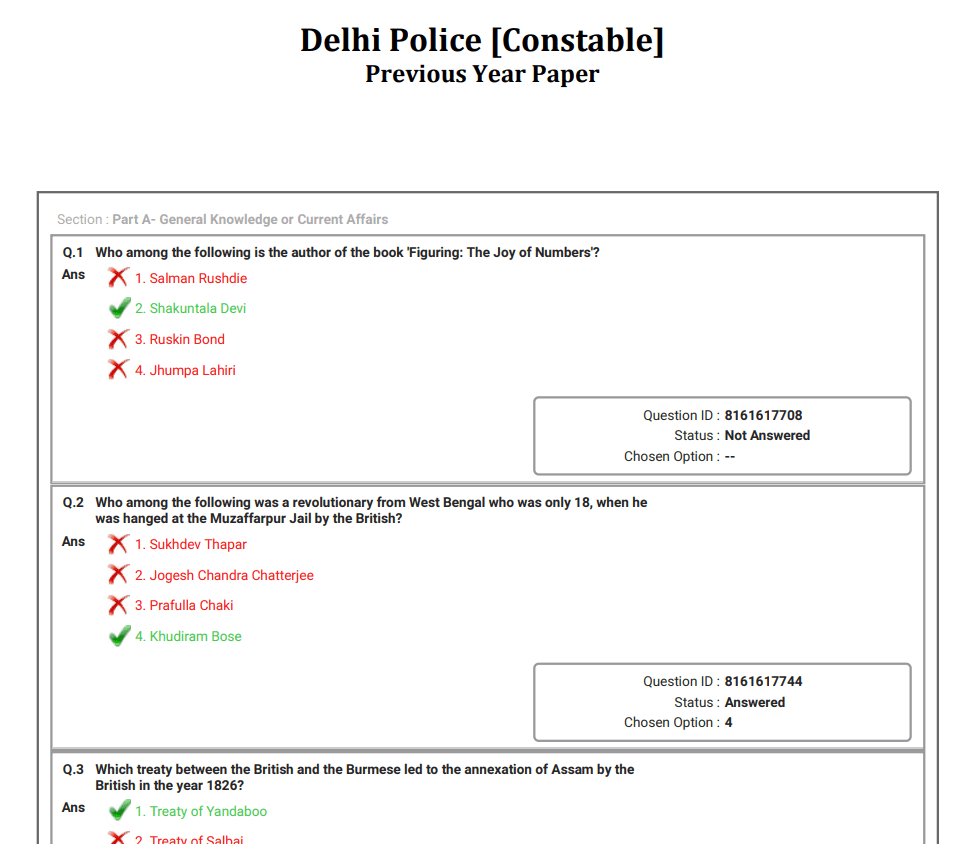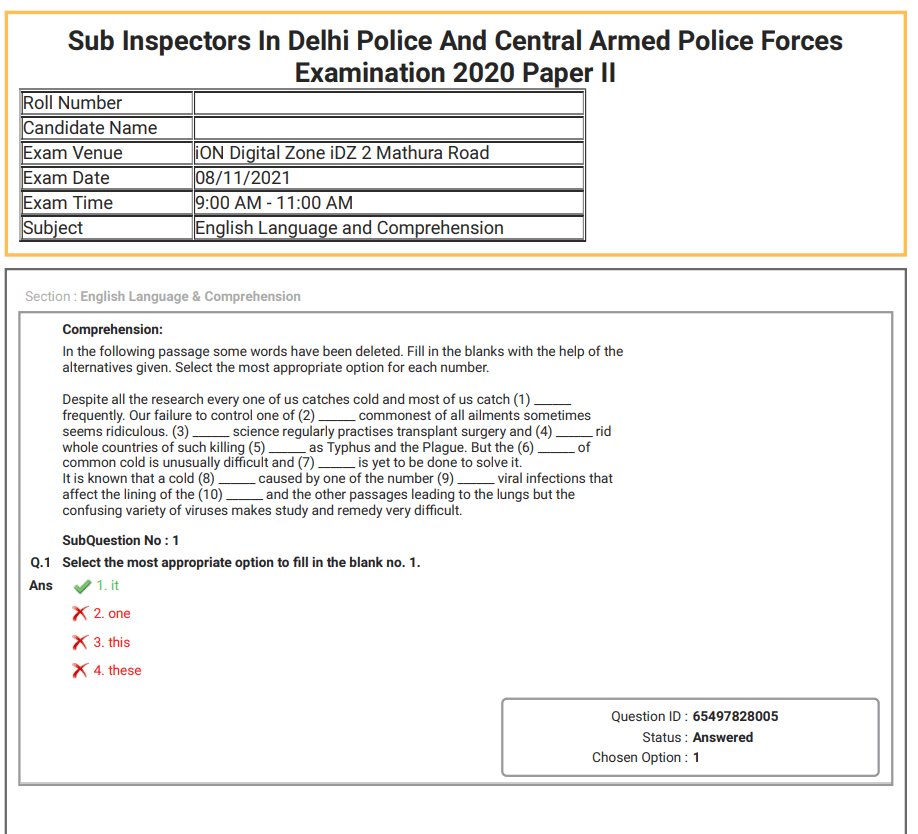The Delhi Police Paper conducted by SSC is significant since it gives applicants a roadmap for preparing for the challenging exam. In addition to offering past assessments, this library of past questions is a valuable resource for applicants wishing to get insight into the nuances of the upcoming SI exam. These sample papers cover a wide range of themes, including general knowledge, reasoning, numeric aptitude, and English language. They offer a sophisticated perspective that assists motivated applicants in refining their skills and organizing their study sessions.
Overview: Delhi Police Paper
| Exam Name | Delhi Police Exam |
|---|---|
| Conduction Body | Staff Selection Commission (SSC) |
| Post | Delhi Police Constable, Sub-Inspector, Head Constable |
| Mode of Application | Online |
| Selection Procedure |
|
| Official Website | SSC |
Download: Delhi Police Paper


| Delhi Police Paper PDF Download | ||
| Paper Title | Year of Exam | Paper with solution |
|---|---|---|
| Constable Paper | 2020 | Download@15rs |
| Constable Paper | 2020 | Download@15rs |
| SI Paper | 2020 | Download@10rs |
Syllabus: Delhi Police Paper
| Section | Topics |
|---|---|
| Reasoning Syllabus |
|
| Numerical Ability |
|
| General Knowledge |
|
| Computer Fundamental |
|
Exam Pattern: Delhi Police Paper
| Delhi Police Exam Pattern | |||
| Subjects | Total Questions | Marks | Test Duration |
|---|---|---|---|
| Reasoning | 25 | 25 | 1 Hour 30 Minutes |
| GK/ Current Affairs | 50 | 50 | |
| Numerical Ability | 15 | 15 | |
| Computer Knowledge | 10 | 10 | |
| Total | 100 | 100 | |
Tips for Good Preparation
- Learn Syllabus Carefully: Learn every topic covered in the syllabus, including the chapters, poetry, grammatical rules, and composition subjects. Make sure you are prepared for the exam.
- Frequent Practice: To enhance your abilities, practice writing assignments and reading comprehension on a frequent basis.
- Concentrate on Writing: Writing abilities should receive particular attention because they are essential to achieve high exam scores. Write stories, letters, and essays as practice to get good marks in the writing section.
- Solve Previous Year Question Papers: Examine past year’s question papers to gain insight into the format and nature of the questions. It will also assist you with time management.
- Revise Often: To help you remember material and enhance your comprehension, go back and review chapters, poetry, and grammar rules on a frequent basis.
- Remain Positive and Confident: Remain upbeat and assured of your skills. Have faith in your readiness and in yourself.
- Maintain Your Health: Make sure you’re eating right, getting enough sleep, and exercising on a regular basis. A sound body promotes a sound mind, which is necessary for studying for exams.
Common Challenges: Delhi Police Paper
Starting an educational path frequently means facing typical obstacles that learners face. Identifying these obstacles is the first step in creating winning plans to get over them. Here, we examine a few common issues that students encounter:
- Time management: It might be difficult to strike a balance between extracurricular activity and academic obligations. It can be difficult for students to set aside enough time for each topic or to stick to a regular study schedule.
- Procrastination: The propensity to put off work can make progress difficult. Procrastination frequently stems from a lack of drive or a sense of overwhelm, which makes it difficult to make the most of study time.
- Subject Comprehension: It might be difficult to understand complicated ideas, particularly in areas like science or mathematics. Inadequate study materials or unclear teaching strategies could be part of the problem.
- Exam Anxiety: People frequently struggle with anxiety and nervousness before exams. Stress levels can rise as a result of performance pressure, exam format confusion, or fear of failing.
- Distractions: Social interactions, technological diversions, or a disorganized study space can take attention away from concentrated study periods, which can affect focus and productivity.
- Lack of Resources: Insufficient study materials or restricted access to resources may make thorough preparation difficult. Students that encounter this obstacle could find it difficult to locate additional resources or different teaching aids.
- Motivation and Burnout: It might be difficult to maintain motivation for an extended amount of time. Burnout is a condition marked by physical and mental tiredness and can be brought on by persistently demanding academic work under pressure.
Enhance your exam readiness, consider these strategies
Exam preparation is more than just learning new material; it’s also about using practical techniques that improve your general preparedness. To guarantee that you enter the examination room confident and well-prepared, think about the following tactics:
- Arrangement of Study Materials: Create a comprehensive study schedule that includes all of your disciplines. Divide your reading material into digestible chunks and set aside particular times for each subject. This reduces cramming at the last minute and guarantees thorough coverage.
- Frequent Editing Sessions: Plan frequent review sessions to help you remember what you’ve learned. Exam recall is improved and memory retention is aided by spaced repetition.
- Mock tests: Examine test conditions by using the 2019 7th Standard Question Paper. Test yourself in a timed environment to get a feel for the exam’s pressure. Examine your performance to see what needs to be improved.
- A Well-Being Lifestyle: Make healthy living a priority. This includes eating a balanced diet, getting regular exercise, and getting enough sleep. Physical health supports mental clarity and improves focus in general.
- Strategies for Active Learning: Take part in study groups, impart knowledge to others, summarize, and other active learning strategies. Active learning promotes a dynamic approach to studying and strengthens understanding.
- Methodical Approach to Examining: Become familiar with the format of the exam and devise a plan of attack for each type of question. Sort the questions according to priority, time, and difficulty.
- Positivity in Thought: Maintain an optimistic outlook. Have faith in your readiness and skills. Having positive ideas helps boost confidence, which is necessary for achieving the best possible results on exams.
FAQ's: Delhi Police Paper
Q- What is the lowest post in Delhi Police?
A- Constables are the lowest rank officers in the Delhi Police. They are responsible for maintaining law and order, preventing crime, and providing assistance to the public.
Q- What is the passing marks for Delhi Police paper?
A-
| Category | Minimum Qualifying Marks |
|---|---|
| General | 35% |
| OBC/EWS | 30% |
| ExSM | 25% |
| SC/ST | 30% |
Q- Is Delhi Police have negative marking?
A- There is a 0.25 negative marking for every wrong answer in the Delhi Police Constable exam 2023.
Q- What is the eye standard for Delhi Police?
A- The eye standard for the Delhi Police Constable is 6/12 for both eyes without glasses.






